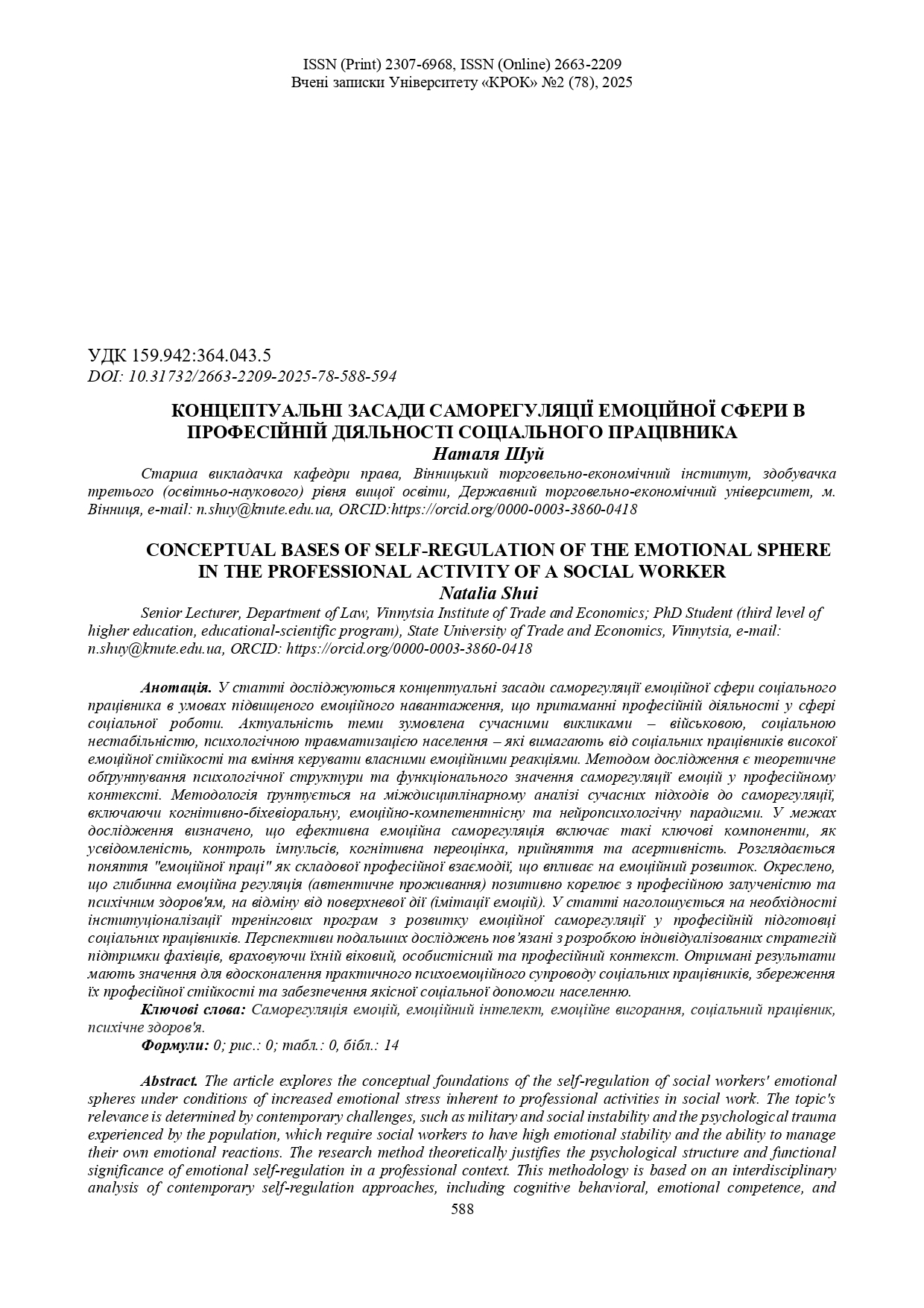СONCEPTUAL BASES OF SELF-REGULATION OF THE EMOTIONAL SPHERE IN THE PROFESSIONAL ACTIVITY OF A SOCIAL WORKER
DOI:
https://doi.org/10.31732/2663-2209-2025-78-588-594Keywords:
Emotional self-regulatio, emotional intelligence, burnout, social worker, psychological well-beingAbstract
The article explores the conceptual foundations of the self-regulation of social workers' emotional spheres under conditions of increased emotional stress inherent to professional activities in social work. The topic's relevance is determined by contemporary challenges, such as military and social instability and the psychological trauma experienced by the population, which require social workers to have high emotional stability and the ability to manage their own emotional reactions. The research method theoretically justifies the psychological structure and functional significance of emotional self-regulation in a professional context. This methodology is based on an interdisciplinary analysis of contemporary self-regulation approaches, including cognitive behavioral, emotional competence, and neuropsychological paradigms. The study found that effective emotional self-regulation includes components such as awareness, impulse control, cognitive reappraisal, acceptance, and assertiveness. The concept of "emotional labor" is considered a component of professional interaction that affects emotional development risk. The study shows that deep emotional regulation (authentic living) positively correlates with professional engagement and mental health, in contrast to superficial action (imitation of emotions). The article emphasizes the need to institutionalize training programs for developing emotional self-regulation in the professional training of social workers. Further research prospects are related to developing individualized support strategies for specialists, taking into account their age, personality, and experience. These results are important for improving the practical psychosocial support of social workers, maintaining their professional stability, and ensuring high-quality social assistance.
Downloads
References
Зарицька, В. В. (2018). Саморегуляція емоцій як чинник професіоналізму сучасних соціальних працівників. У В. В. Нечипоренко (Ред.), Соціальна та життєва практика в структурі професійної підготовки: теорія і практика: збірник тез Всеукраїнської науково-практичної конференції (с. 292). Видавництво Хортицької національної академії.
Сингаївська, І. В. (2021). Використання інтерактивних методів для розвитку психологічної компетентності майбутніх соціальних працівників. Розвивальний потенціал сучасної соціальної роботи: методологія та технології : матеріали V Міжнародної науково-практичної конференції, м. Київ, 12–13 березня 2021 р. (с. 174–176). Київ.
Сингаївська, І. В. (2009). Особливості використання інтерактивних методів у процесі вдосконалення психологічної компетентності керівників освітніх організацій. Вісник післядипломної освіти, 2(13), 304–308.
Тептюк, Ю. О. (2021). Психологічні умови розвитку стресостійкості у соціальних працівників різних вікових категорій (Канд. дис.). Національний педагогічний університет імені М. П. Драгоманова.
Alsadi, R. A. (2025). Life orientation as a mediating variable between emotional security and the positive-self among social workers. ResearchGate. https://www.researchgate.net/publication/391331010_Life_orientation_as_a_mediating_variable_between_emotional_security_and_the_positive_self_among_social_workers
Bagheri Sheykhangafshe, F., Hajialiani, V., & Hasani, J. (2021). The role of resilience and emotion regulation in psychological distress of hospital staff during the COVID-19 pandemic: A systematic review study. Journal of Research & Health, 11(6), 365–374. https://doi.org/10.32598/JRH.11.6.1922.1
Cădariu, I.-E., & Rad, D. (2025, May). Emotional regulation and burnout prevention: Psychological contributions to sustainable social work practice. Technium Social Sciences Journal, 71, 233–250. https://doi.org/10.47577/tssj.v71i1.12782
Goldin, P. R., Moodie, C. A., & Gross, J. J. (2019). Acceptance versus reappraisal: Behavioral, autonomic, and neural effects. Cognitive, Affective, & Behavioral Neuroscience, 19(4), 927–944. https://doi.org/10.3758/s13415-019-00690-7
Hochschild, A. R. (1983). The managed heart: Commercialization of human feeling. University of California Press.
Hochschild, A. R. (2012). Preface to the 2012 edition. In The managed heart: Commercialization of human feeling (pp. x). University of California Press.
Maddock, A. (2025). Examining potential psychological protective and risk factors for stress and burnout in social workers. Clinical Social Work Journal. https://doi.org/10.1007/s10615-024-00924-3
Nook, E. C., Satpute, A. B., & Ochsner, K. N. (2021). Emotion naming impedes both cognitive reappraisal and mindful acceptance strategies of emotion regulation. Affective Science, 2(2), 187–198.
Singh, J., & Hassard, J. (2021). Emotional labour, emotional regulation strategies, and secondary traumatic stress: A cross-sectional study of allied mental health professionals in the UK. The Social Science Journal. https://doi.org/10.1080/03623319.2021.1979825
Załuski, M., & Makara-Studzińska, M. (2023). Emotional burden in social professions and its implications – Presentation of own research results against a literature review. Psychiatria i Psychologia Kliniczna, 23(4), 346–351. https://doi.org/10.15557/PiPK.2023.0043

Downloads
Published
How to Cite
Issue
Section
License

This work is licensed under a Creative Commons Attribution-NonCommercial 4.0 International License.

